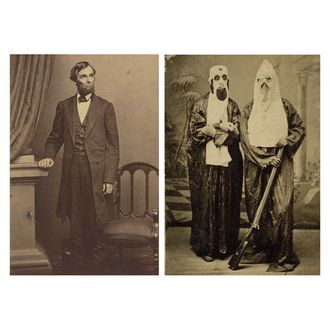
I watched, and even semi-live-tweeted, most of Monday night’s Democratic presidential town hall at Drake University. And I registered that at the very end Hillary Clinton was asked by a student in attendance, “Which of our previous presidents has inspired you most and why?” After everybody got a big laugh at her apology to President Obama and her own husband for not naming either of them, Clinton identified Abraham Lincoln as her inspiration. And then — well, I tuned out, expecting bromides, and went to get a beverage before tweeting some final thoughts.
So I was surprised on Tuesday to read Ta-Nehisi Coates’s report on and interpretation of what HRC said about Lincoln. Here’s the part of Clinton’s tribute that gave him — and me — serious heartburn:
You know, [Lincoln] was willing to reconcile and forgive. And I don’t know what our country might have been like had he not been murdered, but I bet that it might have been a little less rancorous, a little more forgiving and tolerant, that might possibly have brought people back together more quickly.
But instead, you know, we had Reconstruction, we had the re-instigation of segregation and Jim Crow. We had people in the South feeling totally discouraged and defiant. So, I really do believe he could have very well put us on a different path.
As Coates notes, the idea that Reconstruction was a perversion of Lincoln’s magnanimous vision and that it created a bitter chain of events that led to Jim Crow, have long been part of a Southern-influenced “school” on the subject that has only recently been overturned by historians like Eric Foner and many others. It has been reflected broadly in popular history and culture, most famously in the view of Reconstruction presented in Gone With the Wind. Here’s Coates:
[U]ntil relatively recently, this self-serving version of history was dominant. It is almost certainly the version fed to Hillary Clinton during her school years, and possibly even as a college student. Hillary Clinton is no longer a college student. And the fact that a presidential candidate would imply that Jim Crow and Reconstruction were equal, that the era of lynching and white supremacist violence would have been prevented had that same violence not killed Lincoln, and that the violence was simply the result of rancor, the absence of a forgiving spirit, and an understandably “discouraged” South is chilling.
In HRC’s defense, it’s not entirely clear whether the “discouraged and defiant” people in the South she speaks of were the white terrorists outraged by the federal government’s feeble and ultimately abandoned efforts to enforce the Civil Rights Amendments to the U.S. Constitution, or their victims. Most adherents to the “school” Coates is talking about, moreover, were in favor of “segregation and Jim Crow,” not trying to treat it as an evil attributable to Reconstruction; Clinton’s record of support for civil rights is clear enough. And as Coates suggests, she’s probably reflecting what she — or perhaps her speechwriter — was taught on the subject. Despite her exposure to Arkansas later in life, Clinton did not grow up in a part of the country (as I did) in which children were marinated in the “self-serving version” of the history of the Lost Cause and Reconstruction to an extent that made it clear we were being administered propaganda.
So in combination with everything I know about Hillary Clinton, I don’t find her dicta about Reconstruction “chilling,” but it is disturbing, particularly since Clinton only used the litany on Lincoln to make a throwaway, and not terribly convincing, point about bipartisanship. I hope she can find a way very soon to address the history of racism in the United States that shows no influence of the Dixified history in which “old times there are not forgotten” but lied about.






























